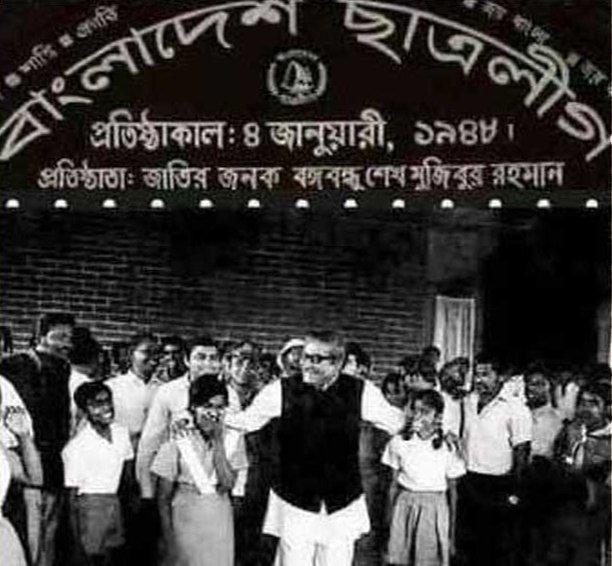Bangladesh Chhatra League, the student wing affiliated with the ruling Awami League, consistently emerges as a proactive force in times of crisis within Bangladesh. This commitment is exemplified by its pivotal roles in historical events such as the 1952 language movement, the victory of the Jukto front in the 1954 provincial council elections, the 1958 anti-Aiyub movement, the 1962 education movement, and the articulation of the six-point demand in 1966.
You can also read: Election Campaign Winds Down Friday Morning!
On January 4, the organization commemorated its 76th founding anniversary through a series of elaborate programs. Established on January 4, 1948, under the leadership of the Bangladesh’s founding president and the father of the nation, Bangabandhu Sheikh Mujibur Rahman, the Bangladesh Chhatra League played a vital role in shaping the country’s trajectory.
To mark this significant anniversary, the BCL arranged a day-long program under the theme ‘Smart Bangladesh, Unnoyan Drishyoman, Barbey Kormo Sangsthan,’ mirroring the slogan outlined in the Awami League manifesto for the upcoming election.
The commemorative activities commenced with the hoisting of national and party flags at the organization’s central office at 6 am, followed by a tribute to the portrait of Father of the Nation Bangabandhu Sheikh Mujibur Rahman at Bangabandhu Bhaban in Dhanmondi at 7:30 am. Further tributes were paid to Bangabandhu Sheikh Mujibur Rahman by laying a wreath at his mausoleum in Tungipara at 7:45 am, and a ceremonial cake-cutting took place at Curzon Hall on the Dhaka University (DU) campus at 8 am.
A vibrant procession unfolded at the base of Oporajeyo Bangla at 10 am, while a reunion is scheduled to take place at a ‘convenient’ time, featuring the presence of Awami League President and Prime Minister Sheikh Hasina in honor of the founding anniversary.
Brief History of BCL
Since the inception of independent Pakistan in 1947, tensions gradually escalated between East and West Pakistan, separated by more than 1,000 miles of Indian territory. East Pakistanis began to perceive exploitation from the West Pakistan-dominated central government. Linguistic, cultural, and ethnic disparities further exacerbated the disconnect between East and West Pakistan. The imposition of Urdu as the exclusive official language of Pakistan faced strong resistance from the Bengalis.
In response to these grievances, Sheikh Mujibur Rahman, the Father of the Nation, took a significant step on January 4, 1948, by establishing a students’ organization known as the Chhatra League. Originally named the East Pakistan Student League, it was formed with Mr. Naimuddin Ahmed as its first convener. The formal organization of the Chhatra League saw Mr. Dabirul Islam as its President and Mr. Khaleque Nawaz Khan as its General Secretary.
The official journey of the Bangladesh Chhatra League commenced at Fazlul Haque Hall of Dhaka University under the leadership of Bangabandhu. This initiation aimed to take a principled stance against the imposition of Urdu as the state language by the then government of Pakistan. Despite being initially named the ‘East Pakistan Muslim Chhatra League,’ the term ‘Muslim’ was soon dropped. Following the country’s independence, the organization continued its activities under the name ‘Bangladesh Chhatra League.’
Reflecting on this transformative history, Bangabandhu asserted, “The history of Chhatra League is the history of Bengalis.”

Chhatra League During Bangladesh’s Crisis
The student wing played a significant role in pivotal historical crisis of Bangladesh, including the 1952 language movement, the victory of the Jukto front in the 1954 provincial council elections, the 1958 anti-Aiyub movement, the 1962 education movement, and the articulation of the six-point demand in 1966.
Subsequently, the organization played a crucial role in liberating Bangabandhu from imprisonment by orchestrating a mass upsurge in 1969. They also played a pivotal role in securing an absolute majority in the 1970 elections and contributing to the country’s independence during the Liberation War in 1971.
Following the attainment of independence on December 16, 1971, leaders and activists of the Chhatra League actively participated in the reconstruction efforts of war-ravaged Bangladesh under the guidance of Bangabandhu Sheikh Mujibur Rahman.
However, the spirit of the liberation war and democratic progress faced a setback after the assassination of the Father of the Nation, Bangabandhu Sheikh Mujibur Rahman, along with most of his family members on August 15, 1975.
In 1981, incumbent Prime Minister Sheikh Hasina returned to the country on May 17 and led a movement to re-establish the spirit of the liberation war and restore democracy.
The Chhatra League played an excellent role during the anti-autocrat movement held in 1990 led by Sheikh Hasina.


